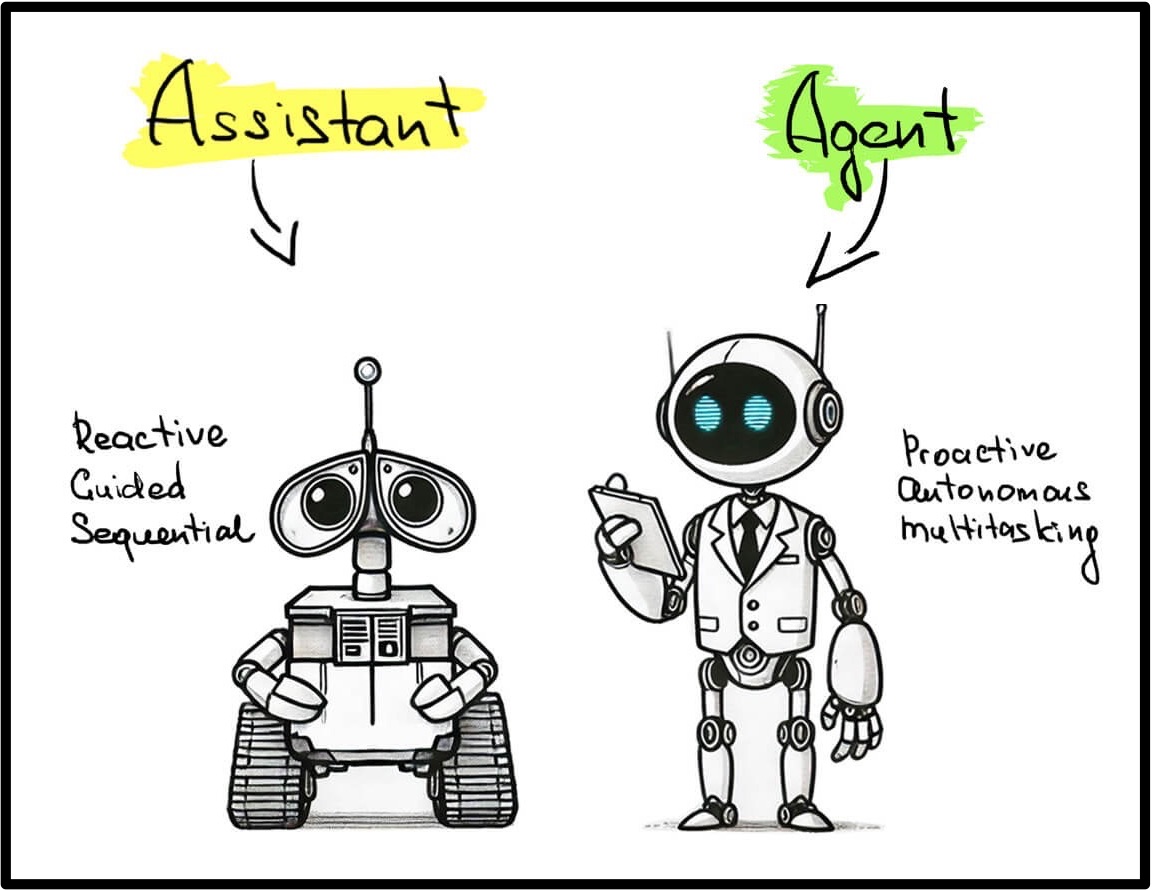In this post, we'd like to discuss the difference between AI assistants and AI agents. As it happens, these two concepts are often used as synonyms and frequently misused. This occurs not only in the business environment but also in the professional community, which isn't helpful for the industry's development. Let's figure this out.
Spoiler alert: To be fair, we should note that today we more often encounter simpler AI solutions - assistants - rather than more complex autonomous programs - AI agents. This is because true agents are still complex to implement and expensive to execute.
From Simple to Complex: Who Are AI Assistants?
To understand AI assistants, let's first look at what 'assistant' means. An assistant is a helper who aids us in solving our tasks. They don’t make complex decisions and operate under our clear guidance. So, they cannot initiate task execution independently. For successful task completion, assistants need clear instructions (prompts). It's like having a conversation where you always need to speak first - the assistant won't jump in without your prompt.
AI Assistants work based on LLMs, so they understand natural language, and we can give them commands using our usual way of communication - as if we were talking to a regular human assistant.
What are AI assistants good at? They excel at organizing information and responding to customer queries. Examples include Siri, Alexa, ChatGPT, Claude, and Microsoft Copilot. They can make recommendations, fetch information, and create content. They're brilliant at handling routine stuff like customer support or writing code, but they're waiting for your signal before each action.
AI Assistants work based on LLMs, so they understand natural language, and we can give them commands using our usual way of communication - as if we were talking to a regular human assistant.
What are AI assistants good at? They excel at organizing information and responding to customer queries. Examples include Siri, Alexa, ChatGPT, Claude, and Microsoft Copilot. They can make recommendations, fetch information, and create content. They're brilliant at handling routine stuff like customer support or writing code, but they're waiting for your signal before each action.
And What About AI Agents?
Here's where it gets interesting. While AI agents are already working successfully in specific industries - like autonomous trading systems in finance or smart monitoring in large networks - they're still not as widely available or accessible as AI assistants. The technology exists and proves its value in specialized applications, but implementing these solutions requires significant resources and expertise.
Think of them as strategic partners who don't just think - they act. Unlike AI assistants who need step-by-step guidance, agents can plan and execute their own approach. Just point them in the right direction - something like 'we need to boost our sales' - and they'll map out and follow their own path to get you there. Plus, they actually learn from experience - each action makes them smarter about future decisions.
What's particularly impressive is that agents can handle multiple complex problems at once, figuring things out on their own even when the situation isn't crystal clear. They can actively use different tools and databases to get their job done, tackling challenges from making lightning-fast trading decisions to managing entire supply chains. It's like having a team of strategic experts who never get tired or overwhelmed by complexity.
But here's the reality check - while this sounds amazing (and it is!), implementing AI agents for general business use is still complex and costly. That's why most companies today still work with AI assistants - they're reliable, proven, and ready to make your business more efficient right now, while we wait for agent technology to become more practical and affordable.
Think of them as strategic partners who don't just think - they act. Unlike AI assistants who need step-by-step guidance, agents can plan and execute their own approach. Just point them in the right direction - something like 'we need to boost our sales' - and they'll map out and follow their own path to get you there. Plus, they actually learn from experience - each action makes them smarter about future decisions.
What's particularly impressive is that agents can handle multiple complex problems at once, figuring things out on their own even when the situation isn't crystal clear. They can actively use different tools and databases to get their job done, tackling challenges from making lightning-fast trading decisions to managing entire supply chains. It's like having a team of strategic experts who never get tired or overwhelmed by complexity.
But here's the reality check - while this sounds amazing (and it is!), implementing AI agents for general business use is still complex and costly. That's why most companies today still work with AI assistants - they're reliable, proven, and ready to make your business more efficient right now, while we wait for agent technology to become more practical and affordable.

